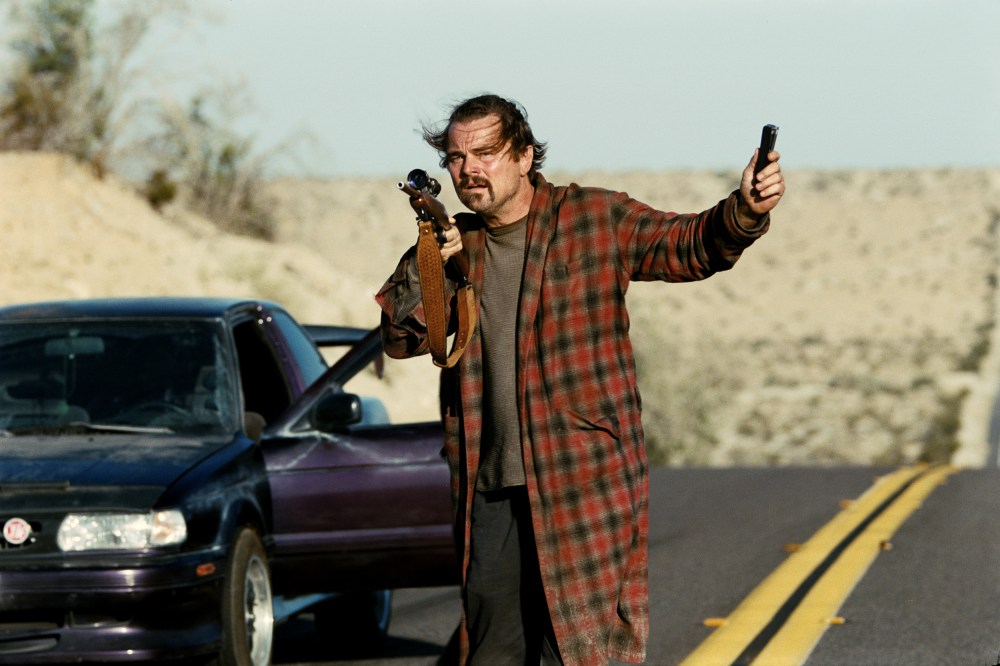“One Battle After Another,” Paul Thomas Anderson’s new movie about the clashes between a radical political cell, the French 75, and a fascist government bent on a campaign of racial purification, has been quickly hailed as the movie of the moment: “a sneakily optimistic vision of how to forge protective bonds in authoritarian times” or “a no to complacency, to oppression, to tyranny.”
The temptation to seize onto “One Battle After Another” is strong. Ten years of arguments against Trumpism have foundered and the administration is pursuing an immigration crackdown with a cruel glee that exceeds even Anderson’s violent, absurd fictional government. Wouldn’t it be nice for art to step into the breach and to provide a crystallizing and galvanizing moment? “One Battle After Another” is something more subtle and perhaps more important: an argument about the risks of turning politics into an aspect of personality rather than a serious means of pursuing change.
What at least some members of the French 75 have is style, and this is where “One Battle After Another” becomes most biting and relevant.
For all its depictions of militarized immigration enforcement, neither the movie nor the French 75, show any particular interest in immigrants as people or immigration as a policy issue. The movie doesn’t tell audiences where these migrants came from, why they preferred to take their chances in Anderson’s version of America — or, tellingly, what happens to them after French 75 members break them out of detention camps.
The French 75 has no particular theory of change, and neither does Anderson, who is wholly absorbed by his claustrophobic little cells of radicals, racists and revolutionary nuns. Bob, the French 75 bombmaker played by Leonardo DiCaprio, could be speaking for the audience when he confesses during a raid, “I’m a little unclear on what the plan is.”
What at least some members of the French 75 have is style, and this is where “One Battle After Another” becomes most biting and relevant. The film is clear that the French 75 had essentially no impact: When the movie jumps forward 16 years, the audience is informed that “the world had changed very little,” and in a letter to her daughter, one of the most committed radicals admits bluntly that “we failed.”

For French 75 member Perfidia Beverly Hills (Teyana Taylor) revolutionary violence is aphrodisiac, organizing principle and go-to justification.. When she confronts Col. Stephen J. Lockjaw (Sean Penn) at a detention camp in the movie’s opening sequence, she doesn’t merely tie him up: She sexually humiliates him. Perfidia and Bob make out in getaway cars, and she insists they have sex near the site of a bombing. After their daughter is born, Perfidia is consumed by what seems like postpartum depression, alienated from her body, jealous of Pat’s bond with the baby and angry at herself for being jealous. Politics becomes a means of escape: Perfidia, who insists that the world has a greater claim on her than her little family, disappears.
She’s not alone in adopting politics as a personality and a style. A pointless bank robbery becomes a stage for power posing and positive self-talk before a member of the French 75 executes a Black security guard. Exchanges of code-words are an opportunity for a desk-bound revolutionary to assert a snippy superiority by reminding a man in the field that “studying the texts is essential.”
Just because people want us to take their ideas seriously doesn’t oblige us to do so.
And Lockjaw longs to become a member of the Christmas Adventurer’s Club, a secret society of powerful white supremacists. He’s seeking the same thing Perfidia found in French 75: “a higher calling,” a sense that he is “superior to other human beings,” an all-consuming justification for any personal whim.












